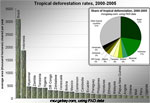Papua seeks funds for fighting global warming through forest conservation
Papua seeks funds for fighting global warming through forest conservation
mongabay.com
August 10, 2007
In an article published today in The Wall Street Journal, Tom Wright profiles the nascent “avoided deforestation” carbon offset market in Indonesia’s Papua province.
Barnabas Suebu, governor of the province which makes up nearly half the island of New Guinea, has teamed with an Australian millionaire, Dorjee Sun, to develop a carbon offset plan that would see companies in developing countries pay for forest preservation in order to earn carbon credits. Compliance would be monitored via satellite.
While the plan could generate millions of dollars in annual income, the concept faces a number of obstacles. First and foremost, there is no binging legal mechanism for carbon offsets from avoided deforestation. This may change in December when the United Nations’ Climate Change Conference will meet on the Indonesian island of Bali to discuss whether to include “avoided deforestation” projects in climate agreements that replace the Kyoto Protocol when it expires in 2012.
Papua’s efforts also face challenges from the central government — namely the Forestry Ministry which maintains that it alone has the power to determine the use of Papua’s forests — and the burgeoning oil palm industry. Chinese and Indonesian companies have recently announced plans to spend billions to convert forest to vast palm oil plantations to be surging demand for biodiesel. Initiatives to limit the use of forest are not popular among such firms.
Nevertheless, Suebu and Sun are busy pitching the concept. In July Sun flew to the U.S. to hold talks with potential investors, including wealth individuals, hedge firms, and companies.
Tom Wright (2007). Indonesian Proposal: Pay Us Not to Chop Down Our Trees. Papua Governor Touts Carbon-Credit Fund; Developers Put on Hold. The Wall Street Journal August 10, 2007; Page A1
Related articles
Is peat swamp worth more than palm oil plantations?
(7/16/2007) Could peat swamp be worth more intact for their carbon value than palm oil plantations for their oil? Quick analysis suggests yes, though binding limits on emissions will be needed to trigger the largest ever flow of money from the industrialized world to developing countries. At stake: the bulk of the world’s biodiversity.
World Bank to raise $250M for avoided deforestation in tropics
(6/11/2007) The World Bank will soon launch an “avoided deforestation” pilot project that will pay tropical countries for preserving their forests, reports The Wall Street Journal. The $250 million fund will reward Indonesia, Brazil, Congo and other tropical forest countries for offsetting global warming emissions. Tropical deforestation accounts for roughly 20 percent of global greenhouse gas emissions, but slowing deforestation slows emissions of heat-trapping emissions. Researchers estimate that “avoided deforestation” schemes may be one of the most cost effective ways to slow climate change. Further, avoided deforestation offers simultaneous benefits including preservation of ecosystem services and biodiversity.
 |
Globalization could save the Amazon rainforest
(6/3/2007) The Amazon basin is home to the world’s largest rainforest, an ecosystem that supports perhaps 30 percent of the world’s terrestrial species, stores vast amounts of carbon, and exerts considerable influence on global weather patterns and climate. Few would dispute that it is one of the planet’s most important landscapes. Despite its scale, the Amazon is also one of the fastest changing ecosystems, largely as a result of human activities, including deforestation, forest fires, and, increasingly, climate change. Few people understand these impacts better than Dr. Daniel Nepstad, one of the world’s foremost experts on the Amazon rainforest. Now head of the Woods Hole Research Center’s Amazon program in Belem, Brazil, Nepstad has spent more than 23 years in the Amazon, studying subjects ranging from forest fires and forest management policy to sustainable development. Nepstad says the Amazon is presently at a point unlike any he’s ever seen, one where there are unparalleled risks and opportunities. While he’s hopeful about some of the trends, he knows the Amazon faces difficult and immediate challenges.
 |
Reducing tropical deforestation will help fight global warming
(5/10/2007) Scientists have lent support to a plan by developing countries to fight global warming by reducing deforestation rates. Tropical deforestation releases more than 1.5 billion metric tons of carbon into the atmosphere every year, though in some years, like the 1997-1998 el Nino year when fires released some 2 billion tons of carbon from peat swamps alone in Indonesia, emissions are more than twice that. Writing in the journal Science, an international team of scientists argue that the Reducing Emissions from Deforestation (RED) initiative, launched in 2005 by the United Nations Framework Convention on Climate Change, is scientifically and technologically sound, and that political and economic challenges facing the plan can be overcome.